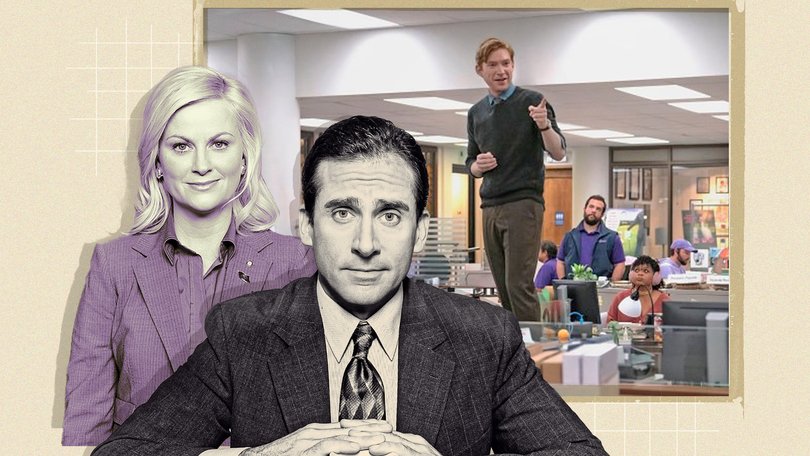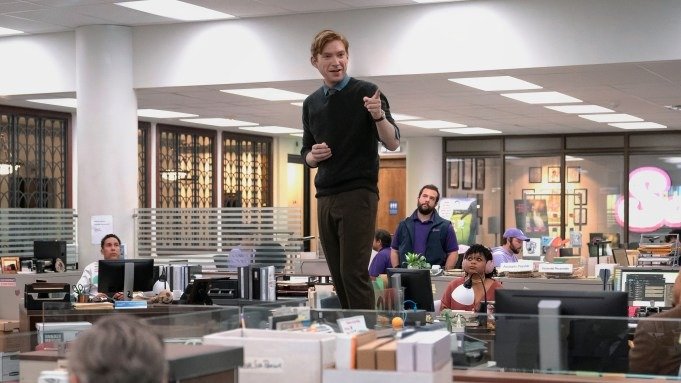The Paper: New sitcom splits the difference between The Office and Parks and Rec
In the long-awaited new spin-off of The Office, there’s a Jim, a Leslie, one Oscar and two Michael Scotts.

Just as there were once Friends people and Seinfeld people - a split that faded when nostalgia for the ’90s drove everyone to binge both - the aughts had Parks and Recreation fans and The Office fans. The two workplace comedies shared a great deal: Both started out as mockumentaries. Both came, in some capacity, from TV powerhouses Greg Daniels and Michael Schur. Both featured zany characters working toward unachievable goals under decidedly uncool but passionate bosses.
But some viewers preferred the warmth and optimism that Parks and Rec delivered, while others gravitated toward The Office’s more astringent, slightly depressive humour. That the American Office is downright saccharine compared with the BBC original only proves how upbeat Americans like their comedy. But even at its most sentimental, The Office remained dedicated to the proposition that work is meaningless. Parks and Rec argued the opposite.
There were, of course, fans of both, and The Paper, Mr Daniels and Michael Koman’s spin-off of The Office for Peacock, feels tailor-made for folks occupying that part of the Venn diagram. Featuring two Michael Scotts and one Leslie Knope, it feels like the child these two sitcoms never had.
Sign up to The Nightly's newsletters.
Get the first look at the digital newspaper, curated daily stories and breaking headlines delivered to your inbox.
By continuing you agree to our Terms and Privacy Policy.The show follows Ned Sampson (Domhnall Gleeson), the Leslie figure, as he toils to revive the Toledo Truth Teller, a regional newspaper that now traffics mostly in ads, cookies and clickbait. Ned, a former star salesman who grew up fabulously rich, is stringently ethical, wildly idealistic and professional to a fault. (He’s mortified by the very idea of causing his staff discomfort or offence.)
If that psychological profile sounds a tad improbable - as if someone decided to graft Andy Bernard’s effete upbringing and Michael Scott’s skill in sales on to Leslie’s sunny sense of civic duty - you’ve grasped the sitcom’s main structural problem. At its worst, The Paper remixes elements that worked in the older shows so enthusiastically that some characters, including the boss, don’t always make sense.
But at its best, The Paper earns some very solid laughs and delivers an appealing world that will benefit from the time Peacock has given it to expand. (The show has already been renewed for a second season.) Few are the mockumentary sitcoms that nail everything straight off the bat; although The Office and Parks and Rec went on to become megahits, both had very rough first seasons.
To its credit, The Paper actively courts these inevitable comparisons. The pilot opens with the fictional documentary crew that spent nine years filming Michael Scott and his employees returning to the old Dunder Mifflin stomping grounds in Scranton, where Bob Vance of Vance Refrigeration reports that the company was absorbed years ago into a corporation called Enervate.
The crew accordingly follows the ghost of Dunder Mifflin to Toledo, where two of Enervate’s subsidiary brands - a toilet paper company called Softees and what little remains of the Toledo Truth Teller - share a floor in a grand old building called the Truth Teller Tower.

Softees is thriving. The Truth Teller is not. The paper employs exactly two reporters: Stars and Stripes veteran Mare (Chelsea Frei), who mostly copies and pastes wire service stories, and Barry (Duane R. Shepard Sr.), a Stanley-Creed hybrid who ostensibly covers local news but mainly wants to nap.
The remaining staff includes Nicole (Ramona Young) in circulation; her admirer, Detrick (Melvin Gregg), who works in ad sales; and a three-person accounting department consisting of a competent woman (Adelola, played by Gbemisola Ikumelo), an incompetent man (Adam, played by Alex Edelman) and Oscar Martinez (Oscar Nuñez), the sole remaining Dunder Mifflin employee. (It’s a running joke that Oscar is sick of the crew and so unwilling to participate that he tries to sabotage any footage he’s in, but keeps getting seduced into commenting against his will.)
Our first guide to this new world is corporate middleman Ken (Tim Key), a pompous, off-brand David Brent who casually harasses employees and mugs for the camera as he introduces us to the old Softees mascot, a cartoon bombshell.
Through Ken, we meet Esmeralda (Sabrina Impacciatore), the acting boss of the Truth Teller, who specializes in atrocious articles about skin care products and celebrities built around the curiosity gap. She’s a nightmare boss in the style of the OG Michael Scott: vain, mercurial and convinced that she’s a natural entertainer. (She is, but not for the reasons she thinks.)
Esmeralda, who happens to be Italian, is also entertainingly vindictive, and the plot really kicks off when Ned is hired as the new head of the Truth Teller, effectively demoting Esmeralda to her old job running the online version of the paper. Impacciatore paints with a much broader comedic brush than the rest of the cast, but she makes it work in ways that remind me of Rainn Wilson’s Dwight in The Office. Her character is wonderfully chaotic, sporadically malevolent and rarely boring.
The spine of the sitcom is the relationship between Ned and Mare, the show’s Jim Halpert stand-in, although Mare doesn’t seem to be in nearly as much existential despair as her Office counterpart. Mare’s looks at the camera punctuate the surrounding absurdity, but she’s more of a joiner than Jim; her genuine journalistic aspirations make it untenable for her to slack off. Ned makes her his star reporter, and they both invest fully in his very weird plan for the newspaper, which is for everyone on the floor - including the Softees employees - to write articles for it on a volunteer basis.
Yeah, it’s kind of a shaky setup. But the show gets in some good hits about the state of journalism. In one episode, Ned gets into a flame war with a young local blogger whose subscriber count far exceeds the Truth Teller’s.
In another, he plans a six-part story around Esmeralda getting catfished. In one particularly strong episode, Ned and Mare go to a mattress store to write an exposé about predatory marketing practices. The pair have terrific chemistry, and The Paper isn’t shy about their romantic prospects. For a sitcom, it’s moving fast.
But, despite its well-chosen target, The Paper isn’t trying to gesture at anything bigger about society or work or American life. The fact that the sitcom’s in-universe David Brent and Michael Scott figures are foreigners (British and Italian, respectively) feels related to the show’s confusion about Ned. That the good boss is American and the bad bosses aren’t sidesteps some interesting questions a show about journalism could tackle in the way Parks and Rec handled the pros and cons of civil service.
The Office, too, gestured at bigger things. It mattered, conceptually, that David Brent and Michael Scott were British and American managers of British and American workplaces at a time when both nations were struggling. Both men were bosses, and both were losers. That contradiction maddened them.
Their struggles to make it as entertainers - and to make their employees captive audiences, and be liked - captured some real and desperate truths about corporate anomie and empires in decline. They testified, obliquely and with some pathos, to the intensity with which we all want to fit into our own cultures and into popular definitions of success, and to the ways in which we’ve already failed without quite realizing it. They were not rich, and that mattered. They were still trying, and that mattered, too.
Ned doesn’t activate any of those broader contradictions or challenges. The character’s backstory feels at odds with Gleeson’s performance. He is enormously charming as a plucky underdog, and his American accent is great, but in Ned he delivers a rich kid without a rich kid swagger, a star salesman with no confidence, and an editor in chief with extreme commitments, zero experience and … some competence? I guess? It’s a likable but unfocused mix, and the character’s strengths and anxieties aren’t crystallizing. The one episode that tried - called I Love You - didn’t nail it. Hopefully the series will figure Ned out.
There’s plenty to enjoy in the meantime while the sitcom, like the Truth Teller, finds its feet.
The Paper premieres Thursday in Australia on Binge
© 2025 , The Washington Post
